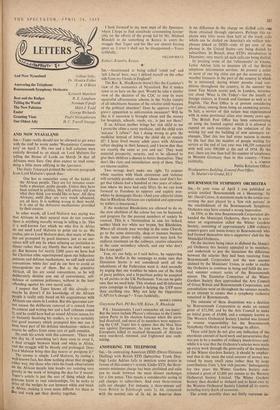And Now Nyasaland Gillian Solly.
Dr. Monica Fisher Answering the Telephone T. A. O'Brien Bournemouth Symphony Orchestra Kenneth Matchett Beer and the Budget R. E. Langhant Telling the World Norman Tiptaft The New Pakistan Mark J. Todd Easter George Richards Granting Visas Paul Christophersen Our Oldest Ally H. C. Travel! Strange AND NOW NYASALAND
SIR,—Taper really should not be allowed to get away with the stuff he wrote under 'Westminster Commen- tary' on April 3. His two and a half columns were entirely devoted to an attack on Lord Malvern for telling the House of Lords on March 24 that all Africans were liars. One does expect to read some- thing a little more edifying in the Spectator.
The Daily Telegraph printed the relevant paragraph from Lord Malvern's speech thus : One has to remember some of the habits of the African people. They are for instance essen- tially a pleasant, polite people. Unless they have been trained in politics, they will always tell you what they think you would like to hear. All these Africans, , until they are very much advanced, are all liars. It is nothing wrong in their world. It is one of the defensive mechanisms provided by their creator.
In other words, all Lord Malvern was saying was that Africans in their natural state do not consider there is anything morally wrong in telling a lie. This is a well-known fact which we who live in Africa do not need Lord Malvern to point out to us. We realise, just as Lord Malvern does, that many of these lies are prompted by good manners, just as we our- selves will tell any lie when refusing an invitation to dinner rather than say bluntly that we don't want to go. But because for nearly 2,000 years we have had the Christian ethic superimposed upon our behaviour Patterns and defence mechanisms, we call such social conventions 'white lies' and do our best to avoid an unscrupulous use of them. But to the primitive African, all lies are social conventions, so he will deliberately deceive you out of convenience, self- defence or common politeness, without in the least offending against his own moral code.
1 suspect that Taper knows all this already—or maybe he doesn't if his knowledge of the African people is really only based on his acquaintance with Africans one meets in London. But this ignorance can- not excuse the deliberate removal of a remark from its context and writing two and a half columns round it; and he could have had no sound African reason for so blatantly deceiving his readers, as it was certainly not good manners which prompted him nor can it have been part of his defence mechanism—unless of course he suffers from some sort of guilt complex.
He ends his article with this comment : 'There will one day be, if something isn't done soon to avert it, a final struggle -between black and white in Africa, and the struggle will be bloody and prolonged. Does Lord Malvern bring that day nearer or postpone it?' The answer is simple. Lord Malvern, by stating a well-known fact, has done nothing about that struggle either way, but those who twist his frank observations on the African people into insults are assisting very greatly in the work of bringing the day for it nearer. Taper's article is just the sort of thing which does grievous harm to race relationships, for he seeks to drive all the wedges he can between white and black in Africa, making it even more difficult for them to live and work out their destiny together.
look forward to my next copy of the Spectator, where I hope to find somebody commenting favour- ably on the efforts of the group led by Mr. Michael Blundell to do something in Kenya to avert the struggle that Taper and his like are almost forcing upon us. I trust I shall not be disappointed.—Yours faithfully, GILLIAN SOLLY Kabazi, Kiambu, Kenya






































 Previous page
Previous page